TimTaiLieu.vn - Tài liệu, ebook, giáo trình, đồ án, luận văn
TimTaiLieu.vn - Thư viện tài liệu, ebook, đồ án, luận văn, tiểu luận, giáo trình các lĩnh vực CNTT, Ngoại ngữ, Luật, Kinh doanh, Tài chính, Khoa học...

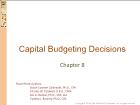 Bài giảng Chapter 8: Capital Budgeting Decisions
Bài giảng Chapter 8: Capital Budgeting DecisionsChapter 8: Capital Budgeting Decisions The term capital budgeting is used to describe how managers plan significant cash outlays on projects that have long-term implications, such as the purchase of new equipment and the introduction of new products. This chapter describes several tools that can be used by managers to help make these types of inv...
 19 trang | Chia sẻ: nguyenlinh90 | Ngày: 19/07/2019 | Lượt xem: 964 | Lượt tải: 1
19 trang | Chia sẻ: nguyenlinh90 | Ngày: 19/07/2019 | Lượt xem: 964 | Lượt tải: 1 Bài giảng Chapter 7: Differential Analysis: The Key to Decision Making
Bài giảng Chapter 7: Differential Analysis: The Key to Decision MakingChapter 7: Differential Analysis: The Key to Decision Making Making decisions is one of the basic functions of a manager. To be successful in decision making, managers must be able to tell the difference between relevant and irrelevant data and must be able to correctly use the relevant data in analyzing alternatives. The purpose of this chapter i...
 18 trang | Chia sẻ: nguyenlinh90 | Ngày: 19/07/2019 | Lượt xem: 856 | Lượt tải: 1
18 trang | Chia sẻ: nguyenlinh90 | Ngày: 19/07/2019 | Lượt xem: 856 | Lượt tải: 1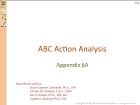 Bài giảng Appendix 6A: ABC Action Analysis
Bài giảng Appendix 6A: ABC Action AnalysisConventional ABC analysis does not identify potentially relevant costs. An action analysis report helps because it: Shows what costs have been assigned to a cost object. Indicates how difficult it would be to adjust those costs in response to changes in the level of activity.
 10 trang | Chia sẻ: nguyenlinh90 | Ngày: 19/07/2019 | Lượt xem: 999 | Lượt tải: 1
10 trang | Chia sẻ: nguyenlinh90 | Ngày: 19/07/2019 | Lượt xem: 999 | Lượt tải: 1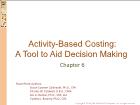 Bài giảng Chapter 6: Activity-Based Costing: A Tool to Aid Decision Making
Bài giảng Chapter 6: Activity-Based Costing: A Tool to Aid Decision MakingChapter 6: Activity-Based Costing: A Tool to Aid Decision Making This chapter introduces students to activity-based costing (ABC), which is a tool that has been embraced by a wide variety of service, manufacturing, and non-profit organizations.
 16 trang | Chia sẻ: nguyenlinh90 | Ngày: 19/07/2019 | Lượt xem: 1079 | Lượt tải: 1
16 trang | Chia sẻ: nguyenlinh90 | Ngày: 19/07/2019 | Lượt xem: 1079 | Lượt tải: 1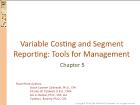 Bài giảng Chapter 5: Variable Costing and Segment Reporting: Tools for Management
Bài giảng Chapter 5: Variable Costing and Segment Reporting: Tools for ManagementChapter 5: Variable Costing and Segment Reporting: Tools for Management Two general approaches are used for valuing inventories and cost of goods sold. One approach, called absorption costing, is generally used for external reporting purposes. The other approach, called variable costing, is preferred by some managers for internal decision making ...
 20 trang | Chia sẻ: nguyenlinh90 | Ngày: 19/07/2019 | Lượt xem: 995 | Lượt tải: 1
20 trang | Chia sẻ: nguyenlinh90 | Ngày: 19/07/2019 | Lượt xem: 995 | Lượt tải: 1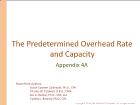 Bài giảng Appendix 4A: The Predetermined Overhead Rate and Capacity
Bài giảng Appendix 4A: The Predetermined Overhead Rate and CapacityCalculating predetermined overhead rates using an estimated, or budgeted amount of the allocation base has been criticized because: Basing the predetermined overhead rate upon budgeted activity results in product costs that fluctuate depending upon the activity levels. Calculating predetermined rates based upon budgeted activity charges products ...
 9 trang | Chia sẻ: nguyenlinh90 | Ngày: 19/07/2019 | Lượt xem: 1000 | Lượt tải: 1
9 trang | Chia sẻ: nguyenlinh90 | Ngày: 19/07/2019 | Lượt xem: 1000 | Lượt tải: 1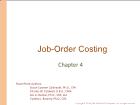 Bài giảng Chapter 4: Job-Order Costing
Bài giảng Chapter 4: Job-Order CostingJob-order costing systems are used when: Many different products are produced each period. Products are manufactured to order. The unique nature of each order requires tracing or allocating costs to each job, and maintaining cost records for each job.
 16 trang | Chia sẻ: nguyenlinh90 | Ngày: 19/07/2019 | Lượt xem: 1067 | Lượt tải: 1
16 trang | Chia sẻ: nguyenlinh90 | Ngày: 19/07/2019 | Lượt xem: 1067 | Lượt tải: 1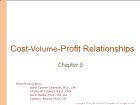 Bài giảng Chapter 3 Cost-Volume-Profit Relationships
Bài giảng Chapter 3 Cost-Volume-Profit RelationshipsBasics of Cost-Volume-Profit Analysis The contribution income statement is helpful to managers in judging the impact on profits of changes in selling price, cost, or volume. The emphasis is on cost behavior.
 16 trang | Chia sẻ: nguyenlinh90 | Ngày: 19/07/2019 | Lượt xem: 1211 | Lượt tải: 1
16 trang | Chia sẻ: nguyenlinh90 | Ngày: 19/07/2019 | Lượt xem: 1211 | Lượt tải: 1 Bài giảng Appendix 2A: Least-Squares Regression Computations
Bài giảng Appendix 2A: Least-Squares Regression ComputationsMatrix, Inc. wants to know its average fixed cost and variable cost per meals served. Using the data to the right, let’s see how to do a regression using Microsoft Excel.
 13 trang | Chia sẻ: nguyenlinh90 | Ngày: 19/07/2019 | Lượt xem: 1076 | Lượt tải: 1
13 trang | Chia sẻ: nguyenlinh90 | Ngày: 19/07/2019 | Lượt xem: 1076 | Lượt tải: 1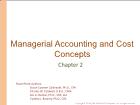 Bài giảng Chapter 2: Managerial Accounting and Cost Concepts
Bài giảng Chapter 2: Managerial Accounting and Cost ConceptsChapter 2: Managerial Accounting and Cost Concepts This chapter explains how managers need to rely on different cost classifications for different purposes. The four main purposes emphasized in this chapter include preparing external financial reports, predicting cost behavior, assigning costs to cost objects, and decision making. We’ll begin by ...
 19 trang | Chia sẻ: nguyenlinh90 | Ngày: 19/07/2019 | Lượt xem: 1046 | Lượt tải: 1
19 trang | Chia sẻ: nguyenlinh90 | Ngày: 19/07/2019 | Lượt xem: 1046 | Lượt tải: 1
Website đang trong thời gian thử nghiệm, chờ xin giấy phép của Bộ TT & TT.

